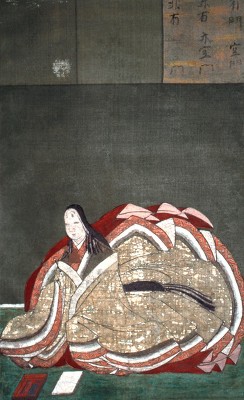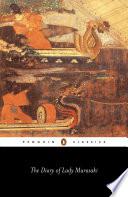“Real things in the darkness seem no realer than dreams.”
Source: Tale of Genji, The Tale of Genji, trans. Arthur Waley, Ch. 1: Kiritsubo
Murasaki Shikibu was a Japanese novelist, poet and lady-in-waiting at the Imperial court during the Heian period. She is best known as the author of The Tale of Genji, widely considered to be the world's first novel, written in Japanese between about 1000 and 1012. Murasaki Shikibu is a descriptive name; her personal name is unknown, but she may have been Fujiwara no Kaoruko , who was mentioned in a 1007 court diary as an imperial lady-in-waiting.
Heian women were traditionally excluded from learning Chinese, the written language of government, but Murasaki, raised in her erudite father's household, showed a precocious aptitude for the Chinese classics and managed to acquire fluency. She married in her mid-to late twenties and gave birth to a daughter before her husband died, two years after they were married. It is uncertain when she began to write The Tale of Genji, but it was probably while she was married or shortly after she was widowed. In about 1005, Murasaki was invited to serve as a lady-in-waiting to Empress Shōshi at the Imperial court by Fujiwara no Michinaga, probably because of her reputation as a writer. She continued to write during her service, adding scenes from court life to her work. After five or six years, she left court and retired with Shōshi to the Lake Biwa region. Scholars differ on the year of her death; although most agree on 1014, others have suggested she was alive in 1031.
Murasaki wrote The Diary of Lady Murasaki, a volume of poetry, and The Tale of Genji. Within a decade of its completion, Genji was distributed throughout the provinces; within a century it was recognized as a classic of Japanese literature and had become a subject of scholarly criticism. Early in the 20th century her work was translated; a six-volume English translation was completed in 1933. Scholars continue to recognize the importance of her work, which reflects Heian court society at its peak. Since the 13th century her works have been illustrated by Japanese artists and well-known ukiyo-e woodblock masters.
Wikipedia

“Real things in the darkness seem no realer than dreams.”
Source: Tale of Genji, The Tale of Genji, trans. Arthur Waley, Ch. 1: Kiritsubo
Passim. Cf. Lacrimae rerum.
Variant translations:
The pathos of things.
A sensitivity to things.
The sorrow of human existence.
Tale of Genji
“Ceaseless as the interminable voices of the bell-cricket, all night till dawn my tears flow.”
Source: Tale of Genji, The Tale of Genji, trans. Arthur Waley, Ch. 1
Source: Tale of Genji, Ch. 17: Eawase (trans. Royall Tyler)
Source: The Tale of Genji
Spoken by Tō no Chūjō in Ch. 2: The Broom Tree (trans. Royall Tyler)
Tale of Genji
Source: Tale of Genji, The Tale of Genji, trans. Arthur Waley, Ch. 19: A Wreath of Cloud
Source: Tale of Genji, The Tale of Genji, trans. Arthur Waley, Ch. 25: The Glow-Worm
source http://no-sword.jp/blog/2010/03/iced_cream.html
The Diary of Lady Murasaki
trans. Richard Bowring
The Diary of Lady Murasaki
In Diaries of Court Ladies of Old Japan
The Diary of Lady Murasaki
Source: Tale of Genji, The Tale of Genji, trans. Arthur Waley, Ch. 29: The Royal Visit
“It is in general the unexplored that attracts us.”
Source: Tale of Genji, The Tale of Genji, trans. Arthur Waley, Ch. 9: Aoi
“There are as many sorts of women as there are women.”
Source: The Tale of Genji
trans. Richard Bowring (Penguin Books, 1996)
The Diary of Lady Murasaki
trans. Richard Bowring
The Diary of Lady Murasaki
“Unforgettably horrible is the naked body. It really does not have the slightest charm.”
The Diary of Lady Murasaki
Source: Tale of Genji, The Tale of Genji, trans. Arthur Waley, Ch. 25
Source: Tale of Genji, The Tale of Genji, trans. Arthur Waley, Ch. 20: Asagao
trans. Richard Bowring
The Diary of Lady Murasaki
Source: Tale of Genji, The Tale of Genji, trans. Arthur Waley, Ch. 36: Kashiwagi
Source: Tale of Genji, The Tale of Genji, trans. Arthur Waley, Ch. 41: Mirage
Source: Tale of Genji, The Tale of Genji, trans. Arthur Waley, Ch. 40: The Law
